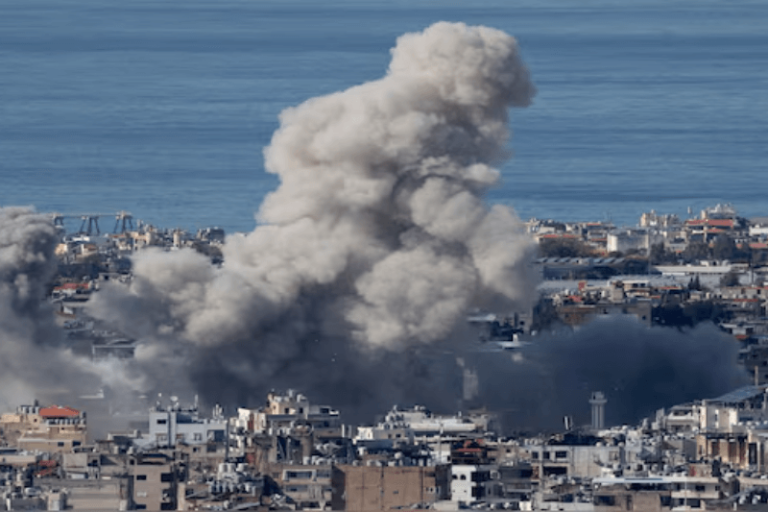

After 14 months of cross border violence that has claimed thousands of lives, Israel and the Lebanese militant group Hezbollah have agreed to a ceasefire.
On Wednesday, it became effective at 4 a.m (02:00 GMT). Under the agreement Israel will “gradually withdraw” its forces from southern Lebanon over the course of the following 60 days with the Lebanese army joining UN peacekeepers in the region.
In Lebanon where thousands of residents were heading south to return home despite an Israeli military warning to avoid previously evacuated regions, the agreement has been welcomed with relief.
Here are a few significant responses around the world:
The ceasefire was welcomed by the Ministry of Foreign Affairs. Ministry spokesperson Mao Ning stated, “We support all efforts conducive to easing tensions and achieving peace and welcome the agreement reached by relevant parties on a ceasefire.”
President Nikos Christodoulides said his country would support Lebanon “in fostering its state institutions including the Lebanese Armed Forces” describing the “mediating role” of the US and France as “invaluable”.
Welcoming the agreement as “a step that could contribute to starting a de-escalation phase in the region.It should be a prelude to stopping the Israeli aggression on Gaza,” the Ministry of Foreign Affairs said.
European Commission President Ursula von der Leyen hailed the “very encouraging news”
of the ceasefire saying it would increase Lebanon’s “internal security and stability.”
The announcement was welcome news “first and foremost for the Lebanese and Israeli people affected by the fighting”, von der Leyen said.
Noting that an agreement would not have been feasible without France’s unique connection with its former protectorate, Foreign Minister Jean Noel Barrot emphasized his nation’s involvement in mediating the truce. “It is true that the United States [has] a privileged relationship with Israel. But with Lebanon, it’s France that has very old ties, very close ties,” Barrot said hours after the ceasefire took force.
“It would not have been possible to envisage a ceasefire in Lebanon without France being involved on the front line,” he added. “It’s a success for French diplomacy and we can be proud.”
Foreign Minister Annalena Baerbock called the deal “a ray of hope for the entire region. People on both sides of the border want to live in genuine and lasting security” she said, adding that the agreement was “a success for diplomacy”.
Welcoming the ceasefire, the Ministry of Foreign Affairs said it “expresses its hope that it will lead to a similar agreement to halt the ongoing war on the Gaza Strip and the Israeli assaults on the occupied West Bank”.
According to the Ministry of Foreign Affairs, any deal that would end the conflict in Lebanon is supported. According to the statement, Russia aspired to a resolution that would guarantee equal security for all sides.
Prime Minister Keir Starmer praised a “long overdue” ceasefire that would “provide some measure of relief to the civilian populations” of both Israel and Lebanon. Calling for the agreement to be “turned into a lasting political solution in Lebanon”, Starmer promised to be at the “forefront of efforts to break the ongoing cycle of violence in pursuit of a long term, sustainable peace in the Middle East”.
Secretary General Antonio Guterres said the ceasefire is “the first ray of hope” in the regional conflict after months of escalation. “It is essential that those who signed the ceasefire respect it in full. I received an auspicious sign yesterday, the first ray of hope for peace amid the darkness of the past months,” he said, referring to the agreement.
“It is a moment of great importance, especially for civilians who were paying an enormous price for this spreading conflict.”
Announcing the deal on Tuesday night, President Joe Biden said it was “designed to be a permanent cessation of hostilities.Civilians on both sides will soon be able to safely return to their communities and begin to rebuild their homes, their schools, their farms, their businesses and their very lives.”
The agreement was described as “good news” by the outgoing president who also stated that the United States was going to lead a fresh attempt to negotiate a ceasefire between Israel and Hamas.
On Wednesday, Biden posted on X: “Over the coming days, the United States will make another push with Turkey, Egypt, Qatar, Israel, and others to achieve a ceasefire in Gaza with the hostages released and an end to the war without Hamas in power.”
Starting April 2, South African drivers will get lower costs when filling their tanks as fuel prices decrease for all…
The U.S.-based driver training company Zutobi analyzed road safety worldwide and found South Africa stays last in driving danger since…
The Basketball Africa League (BAL) returns for its 2025 season with exciting changes and developments. Since 2019 the NBA-linked basketball…
The Somali president supports their military forces to eliminate the threats from Al-Shabaab, ISIS, and Al-Qaeda. The Somali National Army…
UAE President Sheikh Mohamed bin Zayed Al Nahyan held talks with President Faustin Archange Touadéra of the Central African Republic…
African football teams struggle intensely in the World Cup Qualification rounds to earn their place on the international football stage.…
This website uses cookies.